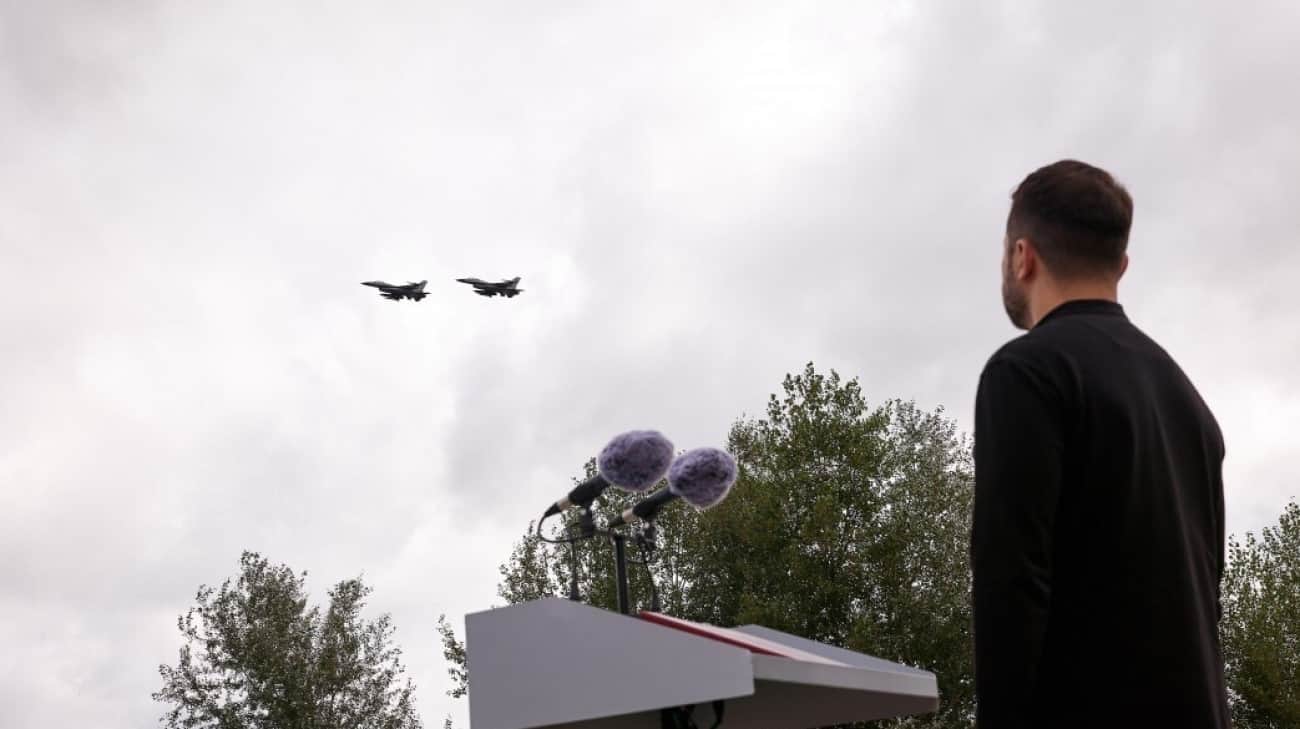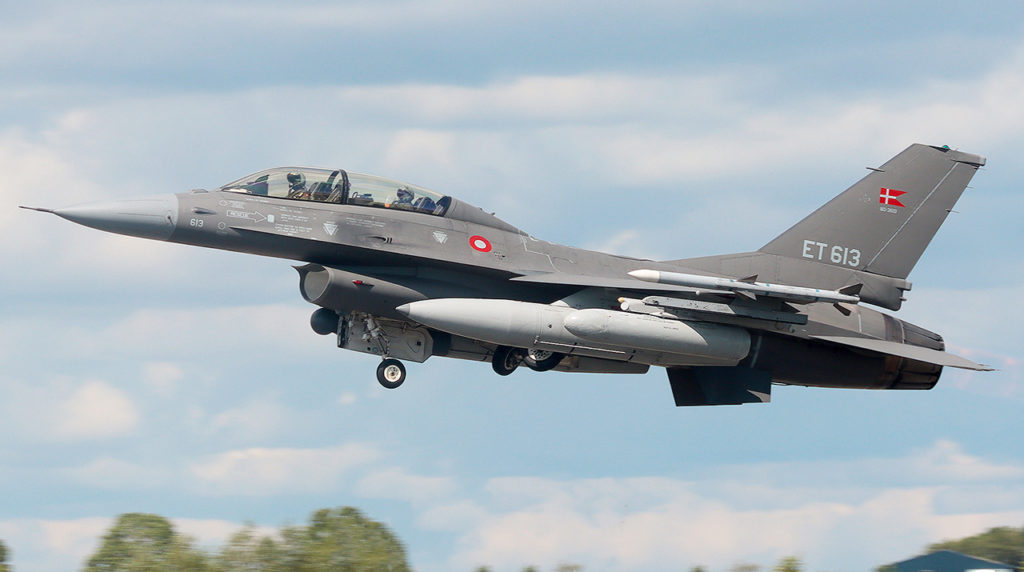Yes, Ukraine can win the war – ex-minister decodes victory plan
Zelenskyy's plan and Ukraine's victory are completely realistic, says Andriy Zagorodnyuk. But there is a crucial caveat -- the current paradigm must be changed.
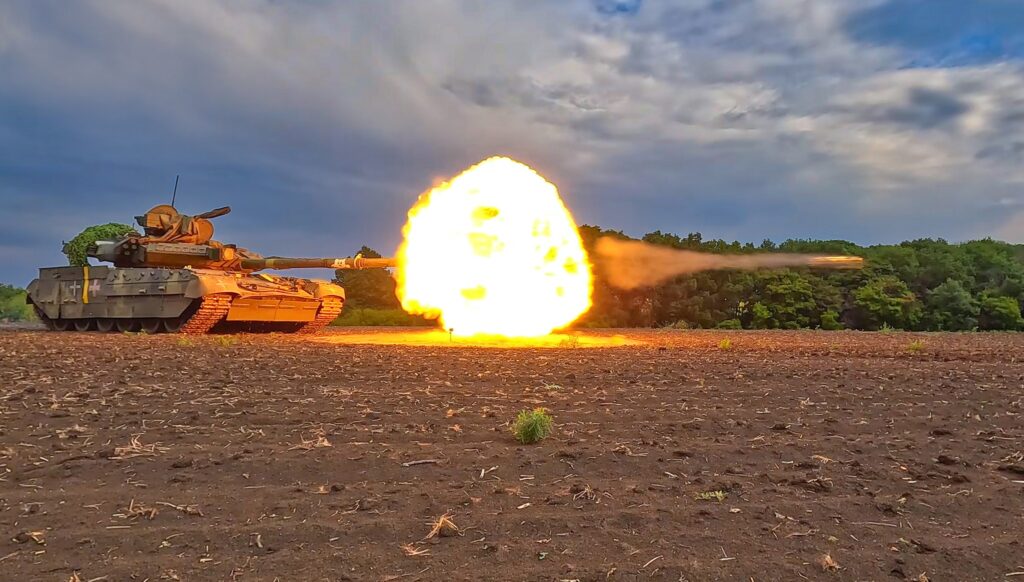

As Russia slowly grinds forward in Ukraine and the resolve of Ukraine’s Western allies to support Ukrainian President Zelenskyy’s goal of a victory over Russia appears to be waning, uncertainty sets in.
Is Ukraine capable of defeating Russia militarily? How can it regain the occupied territories if it is currently retreating and Russia has more manpower? Are Ukraine’s allies doing enough and if not, what should be changed? Is the victory plan that Zelenskyy promotes abroad realistic?
Finally, can Ukraine win this war? We sought the answers to these questions in an interview with Andriy Zagorodnyuk, former Ukrainian Defense Minister and chairman of the Center for Defense Strategies.
Although the victory plan is classified, Mr. Zagorodnyuk claims to deduct its military strategy, and says it is entirely realistic. However, now the ball is in the court of Ukraine’s allies.
Watch the full interview in our video:
Who is winning the Ukraine war?
EP: Back in January, you wrote that Ukraine may not be winning the war, but Russia’s gains were insignificant despite tremendous losses in ammunition, equipment, and personnel. Do you still hold this assessment, given that Russia is gaining ground in Donbas despite Ukraine’s difficult situation?
AZ: I absolutely stand behind this position. I don’t think Russia is winning at all. Yes, they’re advancing, but we need to understand the broader situation.
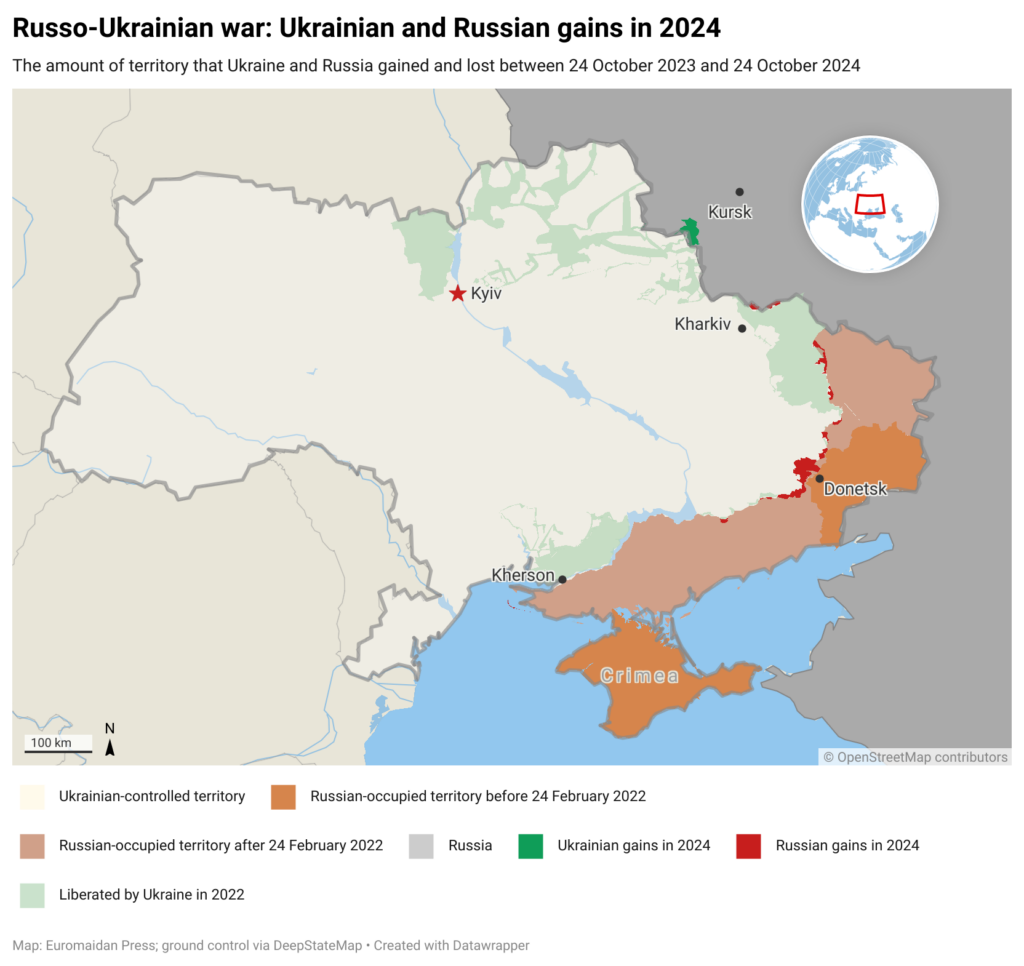
Let’s zoom out.
Russia remains a formidable force. Despite losing over 600,000 people and immense amounts of equipment and resources, it’s still one of the world’s largest armies. By size and budget, it’s definitely in the top five. Currently, it consumes at least 40% of the Russian state budget, though it’s difficult to calculate exact figures since many military expenditures are hidden in different budget categories.
Russia has committed everything to this war.
If any NATO force were to spend half their budget on an invasive war and achieve Russia’s performance, it would be called a disaster.
We’re talking about hundreds of thousands of people, at least 1.5 million armed forces altogether, including academies, reserves, and their production complex. Just look at the Shahed drones – there were 4,000 incursions in just the last two months, according to a recent report. The Russian regime clearly understands this is an existential war for them. After suffering enormous losses and causing tremendous damage to Ukraine, they’re “all-in” – completely invested in this war. Since it’s not going according to plan, they’re throwing more resources at it, hoping this will solve the problem. They’re focusing on stabilizing the front in different areas, particularly advancing in Donbas.
Their current progress costs them approximately 1,500 people per day. Is this winning? Would any other army in the world call this winning? If any NATO force were to spend half their budget on an invasive war – one that wasn’t existential to begin with – and achieve this type of performance, it would be called a disaster.
The world often doesn’t understand this, which is a big problem we need to address. Russia has been extremely successful in their information war, pushing this idea of success so effectively that many people, including some in the European Union and NATO, as well as many journalists and analysts believe Russia is winning.
Truth be told, Ukraine isn’t succeeding much at the moment. However, calling this a Russian success ignores reality.
While Ukraine isn’t succeeding much at the moment, calling this a Russian success ignores reality.
Look at the maritime dimension – Russia’s navy presence has diminished to perhaps one-tenth of what it was before, and that’s mostly confined to the eastern part of the Black Sea. Even in the land domain, which is most sensitive for us, things aren’t going well for Russia.
Evolution of the war
The CDS issues daily free reports from the frontline in English on Substack – CDS Daily Brief.
Let me address what’s happening on Ukraine’s side and the front line.
This war has an unusual setting for modern conflicts—it’s more reminiscent of mid-to-late 20th-century warfare.
The last similar operational setting, apart from the current war, was the Iran-Iraq war in the 1980s. It’s mainly land-dominated, with about 90% of battlefield activities concentrated in what we call the tactical depth—from zero to 30 kilometers into each side’s territory.
The main difference now is the presence of UAVs, drones, and electronic warfare. These largely replace traditional long-range firepower like artillery and MLRS, operating in the same area. FPV drones, in particular, offer better functionality, survivability, and accuracy than traditional systems.
However, we’re still talking about that same operational depth.
Drones and EW have largely replaced traditional long-range firepower like artillery and MLRS
This leaves what we call the operational depths – hundreds of kilometers behind these 30 kilometers – completely free for Russia to set up their forces, recover them, and shape them. This rear area used to be disturbed by HIMARS, but those quantities were limited.
Now it’s targeted by long-range drones and similar systems, but these are precious and can only be used on high-value targets.
Such a war, where all the action happens in the tactical zone, is certainly not something we can keep going indefinitely. In this setting, Ukraine’s largest issue is its extreme exhaustion of personnel. And that setting has to be changed. That’s why our government is insisting on long-range strikes deep in Russian territory.
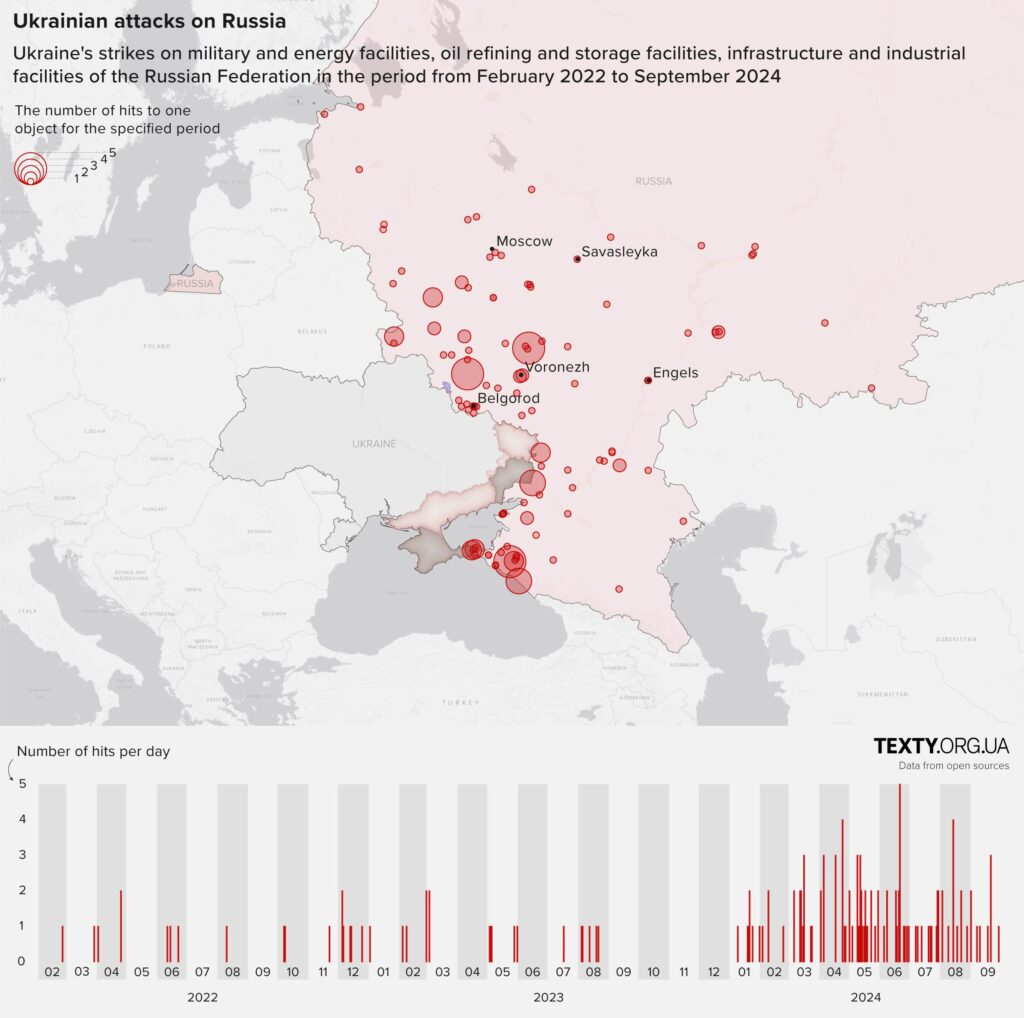
What is Ukraine’s plan?
EP: I’ll be the devil’s advocate here. So Russia is not winning – you convinced me. But at the same time, it is advancing little by little all the time in Ukraine. And Ukraine cannot liberate its territory. So what is Ukraine’s plan now? Is it, as you say, to buy time waiting for political decisions?
AZ: As you know, Ukraine finally has a strategy — the president’s victory plan, which has been presented to many people. It has a massive operational component which is classified, and we won’t discuss it here.
But we can deduce parts of this operational component because it certainly contains some straightforward things.
The plan must be to change the paradigm of the war into more result-oriented operations aimed at liberating territory.
Ukraine conducted successful liberation operations, with the three most obvious being Kharkiv (2022), Kherson (2022), and Kursk (2024). They were all extremely different. All operations will be different because Russians are adapting, we’re adapting, and the operational setting is different in each location.
Some people say surprise wasn’t possible this year because the front was completely visible. Well, look at the Kursk incursion, which was totally a surprise to everybody except Ukrainian forces. Surprise is possible, but of course, it’s not guaranteed in every case.
In the case of Kherson, there was no surprise the Russians expected a Ukrainian counteroffensive for months in 2022, and it happened because they simply couldn’t do much. But we cannot replicate Kherson – the situation is completely different now.
From what we understand, the plan still includes moving forward with liberation. Of course, it has to be resourced with weapon systems, as they are critical for capabilities.
Now, can we do that? Is it possible physically? Are these weapon systems available, or can they be built in the foreseeable future so that they are still relevant to this campaign plan? Yes, it is possible.
Is Ukrainian success possible? Absolutely. The question is that we depend on our partners for funding and provision of certain weapons systems.
So, is Ukrainian success possible? Absolutely, technically, and organizationally. The question is, do we depend on partners for that? Yes, we do. Unfortunately or fortunately, that’s the situation. We depend on them for funding and provisions of certain critical weapon systems.
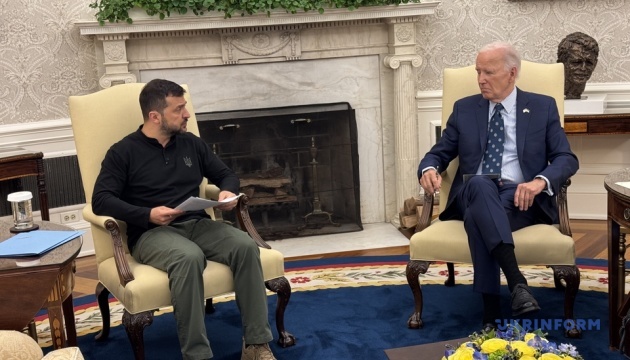
EP: What do you make of this plan? Could you help our listeners visualize what Ukraine’s victory plan could look like if we get this air superiority and the right to strike into Russia?
AZ: Certainly, the plan must be possible from the technical and organizational perspective. From what we hear, even from Zelenskyy’s speech in Ukraine’s parliament, it is agnostic in certain ways – consciously leaving certain things uncovered, which is fine. No strategy has to cover all issues from the beginning to the end.
The scenarios of this war can be different. But certainly, they all assume that Russia’s offensive operations should start failing, and Ukrainian counter-offensive operations should start succeeding. This is not going to be one sweeping operation like in World War Two style on a huge front of 1,500 kilometers — it is not possible in today’s war. Most likely it is going to be a chain of serious operations. If they start to succeed, we will have a situation when Putin will realize that he’s losing the war. And then the question of where it stops is actually secondary, believe it or not. Because it is more important to change the course of war.

Hi! My name is Alya Shandra, I’m the author of this piece. I believe in the power of data and analysis, and that’s why we try to give you the best of it at Euromaidan Press.
Become our patron to help us bring you the best insights from Ukrainian and foreign analysts so we can cut through the noise together.
Right now, strategically, it looks like a stalemate. Strategically, not operationally, as there are lots of things happening on the front. But strategically, it looks like a stalemate because clearly, Russia cannot win. They can crawl slowly and take some kilometers of Ukrainian territory, but they’re getting exhausted even in that, and that doesn’t help. Victory for them is the destruction of Ukraine’s statehood. They’re clearly not near that goal.
For Russia, victory is the destruction of Ukraine’s statehood, and they’re clearly not near that goal. Ukraine’s victory is establishing long-term peace.
However, Ukraine is also not winning because Ukraine’s victory is establishing long-term peace. And long-term peace doesn’t seem to be possible now, obviously.
What Ukraine needs for victory
EP: What needs to change for Ukraine to start winning operations?
AZ: We need to enable Ukraine to conduct full-scale combined arms campaigns with necessary capabilities. There is no one single key, and they are not secret, because these things are obvious to any NATO general.
As of late 2024, we can clearly say that some long-range weapon systems and aerial capabilities – tactical aviation owned by our partners and potentially available to Ukraine – are competitive. But what’s going to happen in a year remains a big question.
The key changes needed are:
1. Long-range Strike Capability
No NATO general would seriously claim we can achieve military success without the ability to strike into enemy territory. With the current operational setting, where Russia launches everything from their territory, it’s impossible to be on a winning path without striking Russian territory. This isn’t some innovative secret – it’s basic military logic.
2. Air Power
We can’t seriously discuss this war without looking at air power. Russia is using about 900 gliding bombs per week. Planning anything without considering the air power component is unrealistic — no NATO joint command would ever plan a modern war without first gaining air superiority, or at least air parity and air denial for Russian aviation.
3. New Technologies
This could perhaps be considered as a secret key. Some key elements would be:
– Interesting technologies on unmanned platforms
– Electronic warfare platforms
– AI systems, particularly in autonomous systems and optical recognition
– These systems are developing like crazy, improving literally every day.
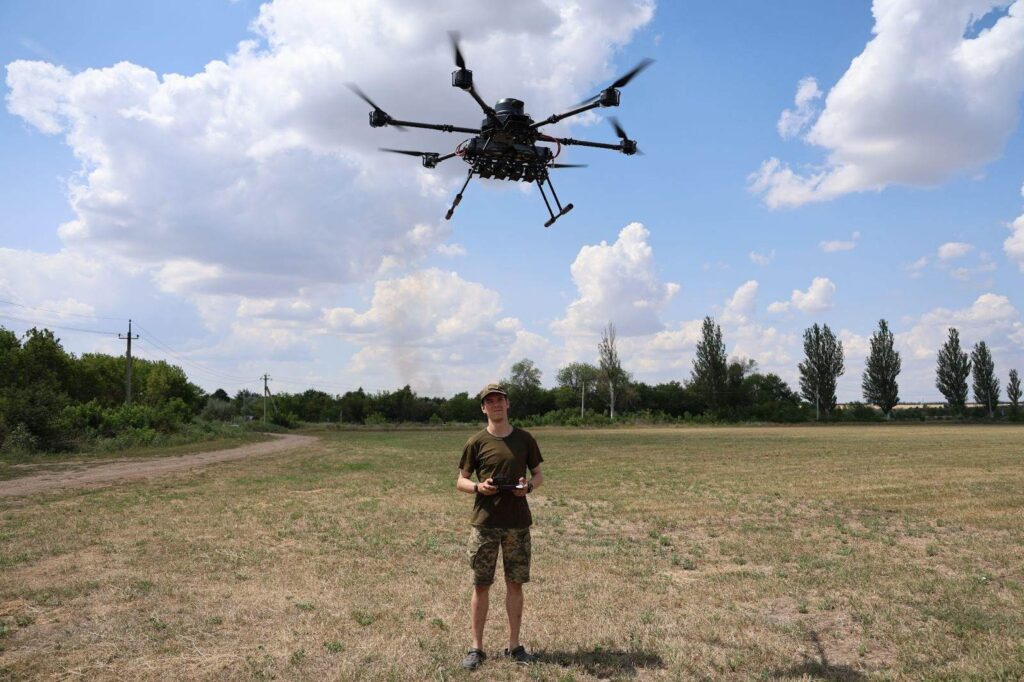
Looking at the war’s evolution: In early 2022, Ukraine succeeded in liberating half its territory using mainly Soviet legacy weapons and Ukrainian developments based on those. Russia made numerous mistakes in the first two days, which Ukraine exploited successfully.
By late 2022, those Soviet-era weapons were largely depleted, and Ukraine began transitioning to NATO systems. In 2023, we were still using about 50% Soviet-standard weapons, but now the vast majority are NATO equipment. This is a historic transition that needs to be recognized.
By the end of 2022, we had already used quite a few drones. New operational approaches were evolving.
Clearly, the Russians caught up. They were lagging at the end of 2022, realizing they were losing it. It was a fantastic chance for Ukraine to move further, but we didn’t for a whole number of reasons. In 2023, we spent quite a lot of time preparing for something that didn’t work out. But Russians were evolving their operations. They built a lot of drones and new weapon systems.
2023 was very different from 2022, and 2024 is very different from 2023. The adaptation and evolution of this war are tremendous. Things are completely different after half a year.
Future scenarios and technological evolution
EP: Which Western weapons have been the most important so far, and which ones does Ukraine need right now the most?
A: It is not like that; it’s all about combined operations. There is no secret magic – it’s always combined. Even when we take long-range strikes. ATACMS was much discussed, but they are only useful when used within an operation, within a plan and with some kind of role. You don’t get some weapon and then win the war. You get a combination of weapons that enable you to do certain types of operations, and then you win the operations. And then the chain of victories may get you to a political outcome that can be called victory in the future.
Victory is a political, not a military term. The military operates with operations; you can potentially win all of them, and people look back and say that war was lost. Look at Afghanistan – most operations were won by the coalition, and in the end, the Taliban returned and runs the country right now.
Victory is a political, not a military term. You can win all the operations, but lose the war.
The Crimean War is another example. It was extremely unpopular in the West. This was the first war broadcast in real-time, like now, because of the telegraph.
People in London read the news every morning from yesterday’s front lines. The front lines weren’t ready for that transparency – there were lots of mistakes, logistical issues, problems with food supplies, warm clothing, failed battles, operations, lots of casualties, and problems with medical care.
People hated that war. Everyone said it was not going well, similar to what they’re saying now.
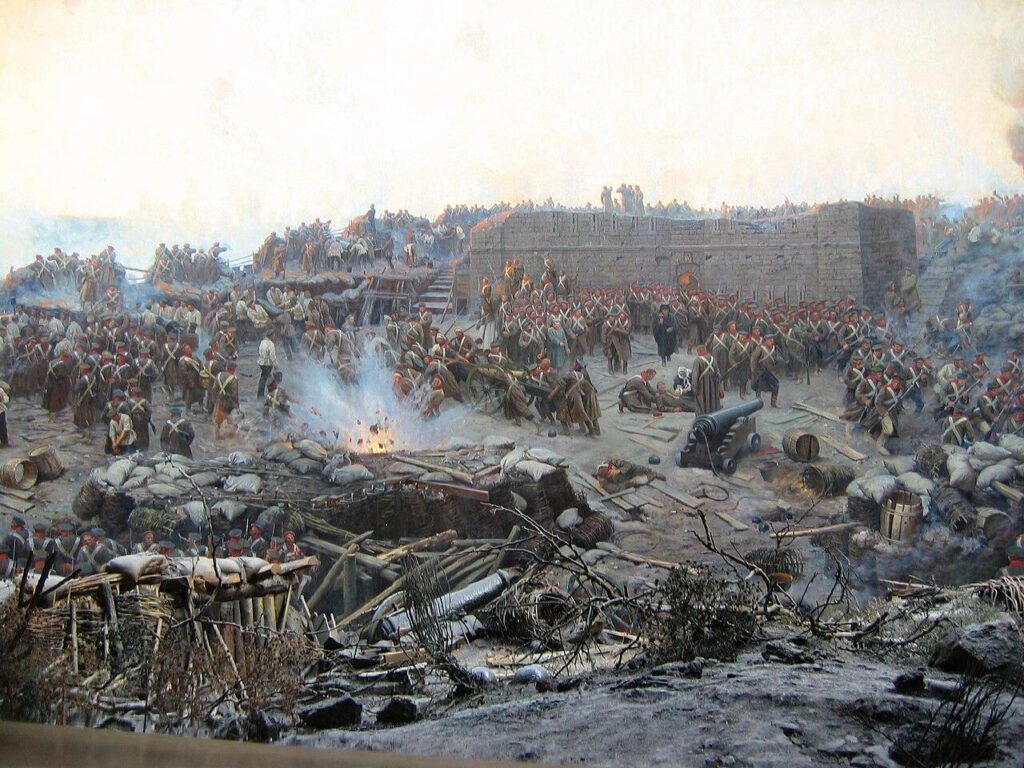
The most famous battles from that war are actually losses. But in the end, when the peace treaty was signed in 1856, Russia had no Black Sea Fleet. The Russian regime was on the brink of complete disaster. The Tsar was depressed and effectively killed himself – he died of pneumonia, but historians think it was concealed suicide.
Now, it’s considered that Russia lost this war, but back then, people thought everything was going badly.
At the time, people in London thought the Crimean War was going terribly. But in 1856, Russia lost and its regime was on the brink of disaster.
Looking ahead to 2025-2027, we’re at decisive moments for certain systems. Key questions include:
- Will electronic warfare systems be able to block FPV drone operations? If so, we’ll see one type of warfare focused on electronic warfare.
- If FPV operations can still penetrate electronic warfare defenses and we maintain real-time battlefield visibility, it will be an FPV-dominated war – whoever has better FPV capability will win.
- Will FPV capabilities extend beyond 30 kilometers to hundreds of kilometers?
- What about AI? We’re seeing interesting developments, with immense amounts of data being collected and analyzed in both Ukraine and Russia. This data processing will enable serious computer vision capabilities.
- If these capabilities enable completely autonomous weapons, as many suggest, we’ll see a robotic war that will make current operations totally irrelevant.
EP: In these scenarios, there’s one thing our Western partners cannot give us – manpower. We’re seeing reports that many sections of the front don’t have enough soldiers. Can Ukraine win with weapons but without people?
AZ: Yes, if we change the type of operations we’re fighting. Continuing to face the enemy on the front while only penetrating tactical depths will be extremely difficult. We’re essentially playing Russia’s playbook, which consciously imposes its advantages on us.
Ukraine can win with fewer people if it can penetrate strategic depths. Right Russia is at an advantage, as deaths do not matter for them.
For us, each death is a tragedy, and we have many tragedies daily. For Russia, it doesn’t matter – they can spend 10,000 people to capture a village with 500 inhabitants and still consider that a success.
We must change the paradigm of the war. Delaying that change only deepens the problem.
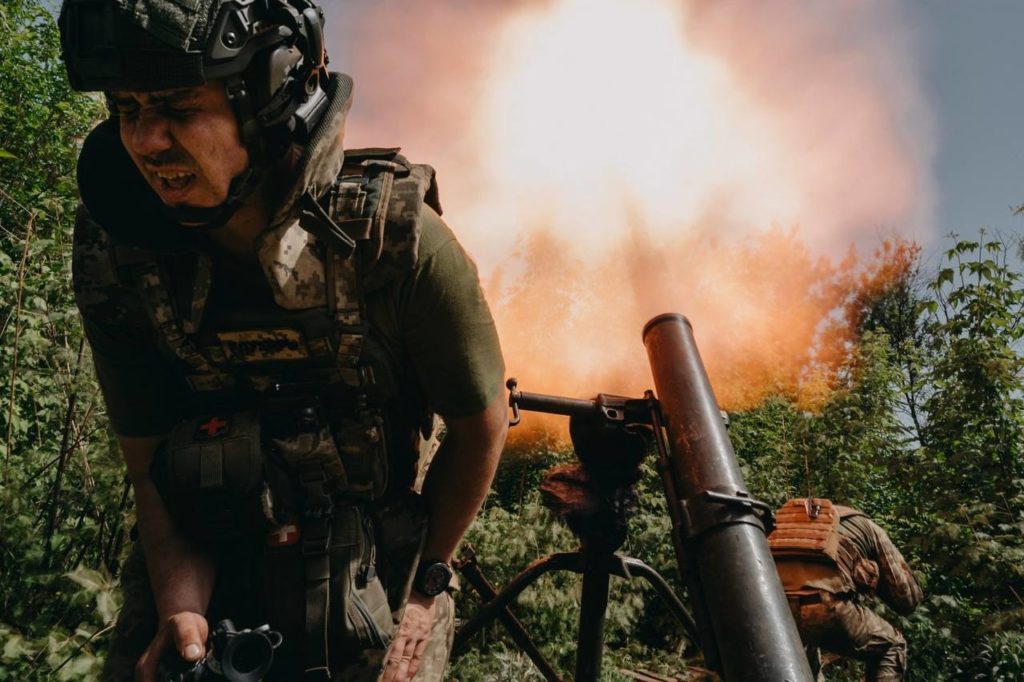
Western support and strategic requirements
EP: You wrote earlier that if Kyiv is backed by the combined Western economy and even a fraction of Western defense budgets, it will be fully capable of succeeding. Victory isn’t a question of possibility but of correct strategy and policy choices. While NATO is certainly richer than Russia, have they lived up to this promise over two and a half years of war? Are they truly choosing to back Ukraine’s victory?
AZ: No, the short answer is absolutely not. This is our big political challenge of an existential nature.
That said, we have received significant budget support — tens of billions, and altogether hundreds of billions. It would be completely wrong to say NATO doesn’t help Ukraine. Without that support, we wouldn’t even be able to discuss what we’re talking about now. Ukraine would be in an extremely difficult position, and Russian occupation would extend much further than it does now.
We must appreciate that many NATO generals, ministers, deputy ministers, and civil servants work daily to help Ukraine. Many travel to our country regularly and work with our ministries. The reason Ukraine exists, that 80% of Ukrainian territory remains under Ukrainian government control, and its economy continues to function is possible only because of their help.
However, are we on the path to victory? No, we’re not right now.Critical political decisions still need to be made. What were the concerns so far? The big elephant in the room is escalation considerations. It’s no longer a secret that in November-December 2022, the US government seriously believed Russia was ready for nuclear escalation.
Do we want a nuclear war? No, certainly not. Was Russia really ready for nuclear war? It’s still debated, but clearly, they didn’t go there in late 2022.
We believe these escalation concerns are overestimated and overcautious. In fact, being overcautious actually promotes escalation because it encourages Russia to keep playing with nuclear threats – they see it works.
Current opportunities and victory plan
ATACMs were discussed for over a year, F-16s for over two years – these decisions could have happened much quicker. We missed massive opportunities to continue the counter-offensive in 2022 and to do better in 2023. Can we just blame NATO? No, we have our own issues to address.
But the question now is: Is there still a chance for a successful outcome? Yes, there is. Looking to the future, do we see reasons not to provide Ukraine with the weapons we discussed? No. Are more resources available in the West to enable Ukrainian victory? Absolutely, 100%. It’s not a resource question — it’s a question of proper operational and campaign planning.
The good news is that now we have a strategy – the president’s victory plan. If we were talking two months ago, I would say we needed a plan. Now the plan is ready. It can be improved and made more detailed, but the general strategy is there.
Providing Ukraine with the weapons needed for victory is not a question of resources but of proper operational and campaign planning.
International support and future implications
EP: The world is watching the United States and awaiting the election results. What would a Trump victory or Harris victory change for Ukraine?
A: Everything, pretty much. The United States remains the leader of the Ramstein coalition. The US is the force that can change any war. Their policy is crucial, and they own technologies and systems that are absolutely critical.
We’re in a very uncertain space. As we saw from yesterday’s statement, Harris isn’t going to continue Biden’s policy. They’ll be developing their own policy – they’ve clearly stated that. This isn’t necessarily bad news for us; it could actually be very good news. But it’s something we need to understand.
There will be a new president with a new cabinet, new administration, new National Security Council, and certainly with a new policy. And obviously a new policy will be developed if Trump wins. But it’s unclear in both cases what it will be. The good thing is that Ukraine now has a strategy. The question is how the US government will proceed.
Questions from Euromaidan Press patrons
EP: Western support largely depends on public opinion, and far-right politicians are exploiting this by spreading misinformation about Ukraine. How can we effectively counter this?
Euromaidan Press patrons can suggest their questions to speakers. Become one and find out what you’ve always wanted to know (and turn the ads off, too).
A: This is a massive problem. People are seriously discussing claims that Ukraine steals money provided by the West for weapons, which is complete nonsense. First, the West provides weapons, not money for weapons. Second, there hasn’t been a single piece of evidence of weapons misappropriation in these three years.
There are also more complex issues, such as some people saying Ukraine should cede territory because it’s not succeeding. This isn’t disinformation – it’s an opinion, but it diverts us from the right course.
This is not a war about territory. If we tell Putin, “OK, take this city and this city and stop,” Putin will not stop. He will take these cities and then say, “OK, I’m actually gaining something. So I will continue.”
He did that already with Chechnya. If you remember, Russians froze the Chechen war with Khasavyurt agreements. And after that, Putin unfroze it and decided to restart it. So he clearly can restart that one if we don’t build this denial mechanism.
There is a legend that Russia is invincible because it has so many resources. But actually, it lost more wars than it won.
There is also the opinion that Russia cannot lose wars because it has so many resources. But actually, it lost a lot of wars, many more than it won. However, they have a legend about Russian invincibility. It is pure legend, unsupported by facts, but they are pushing this so successfully that many people think it is true.
We will always have this problem because many people get their information from the wrong sources. That’s life. We just need to continue bringing the truth to as many people as we can.
EP: What documented initiatives to help Ukraine have been ignored? What do you want every global citizen to know about?
We want every global citizen to know about, perhaps, the Budapest Memorandum. That was ignored pretty much.
Also, there is a renewed interest in Ukraine’s accession to NATO. Ukraine has been in the waiting room probably longer than you can imagine, and I’m quite surprised that at the Washington summit this summer, it became a very prominent question.
Of course, there have been some reservations on how Article 5 would work, but nevertheless, the discussion is there.
The biggest issue right now is that many people are tired of the war. When people in the West tell me they’re tired, I suggest they spend a few nights under Russian Shahed drone strikes and then talk about being tired. Their fatigue from reading news is nothing compared to what Ukrainian people are experiencing.
What’s often forgotten is that this war is much bigger than Ukraine. It’s about the future history of the world.
What’s often forgotten is that this war is much bigger than Ukraine. It’s about the future history of the world. The Biden administration understood this from the beginning – the strategic and historical importance of this war. Every time they justify support for Ukraine, they emphasize this historical significance.
But many people miss this point. They think it’s just about supporting Ukraine because Ukraine is suffering. While we appreciate that support, this is about ensuring the world doesn’t fall apart – which it will if Russia succeeds. This is what we need to fix together.
Related:
- Meet “Russian disease,” the centuries-old corruption plaguing Ukraine invasion
- “Do not despair.” Ex-minister Zagorodnyuk on lessons from Ukraine’s counteroffensive
- Ex-Minister Zagorodnyuk: Ukraine can defeat Russia, but West must commit to total victory
- Leaked intel, late aid deliveries: RUSI report exposes flaws in Ukraine’s 2023 counteroffensive
- A realistic victory strategy for Ukraine
- Zelenskyy unveils 5-point ”Victory Plan” to Ukrainian Parliament


